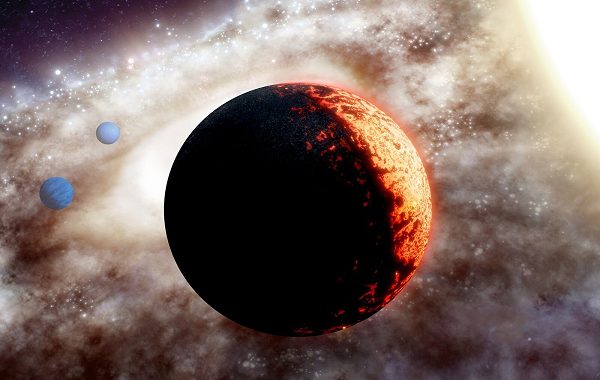Whereas scientists have amassed appreciable information of the rocky planets in our photo voltaic system, like Earth and Mars, a lot much less is understood concerning the icy water-rich planets, Neptune and Uranus.
In a brand new examine not too long ago printed in Nature Astronomy, a workforce of scientists recreated the temperature and strain of the interiors of Neptune and Uranus within the lab, and in so doing have gained a larger understanding of the chemistry of those planets’ deep water layers. Their findings additionally present clues to the composition of oceans on water-rich exoplanets outdoors our photo voltaic system.
Neptune and Uranus are conventionally thought to have distinct separate layers, consisting of an environment, ice or fluid, a rocky mantle and a metallic core. For this examine, the analysis workforce was notably concerned about doable response between water and rock within the deep interiors.
“By way of this examine, we have been searching for to increase our information of the deep inside of ice giants and decide what water-rock interactions at excessive situations would possibly exist,” says lead writer Taehyun Kim, of Yonsei College in South Korea. “Ice giants and some exoplanets have very deep water layers, not like terrestrial planets. We proposed the opportunity of an atomic-scale mixing of two of the planet-building supplies (water and rock) within the interiors of ice giants.”
To imitate the situations of the deep water layers on Neptune and Uranus within the lab, the workforce first immersed typical rock-forming minerals, olivine and ferropericlase, in water and compressed the pattern in a diamond anvil to very excessive pressures. Then, to watch the response between the minerals and water, they took X-ray measurements whereas a laser heated the pattern to a excessive temperature.
The ensuing chemical response led to excessive concentrations of magnesium within the water. Based mostly on these findings, the workforce concluded that oceans on water-rich planets may not have the identical chemical properties because the Earth’s ocean and excessive strain would make these oceans wealthy in magnesium.
“We discovered that magnesium turns into way more soluble in water at excessive pressures. In reality, magnesium may change into as soluble within the water layers of Uranus and Neptune as salt is in Earth’s ocean,” says examine co-author Sang-Heon Dan Shim of Arizona State College’s College of Earth and Area Exploration.
These traits may additionally assist clear up the thriller of why Uranus’ environment is way colder than Neptune’s, though they’re each water-rich planets. If way more magnesium exists within the Uranus’ water layer under the environment, it may block warmth from escaping from the inside to the environment.
“This magnesium-rich water may act like a thermal blanket for the inside of the planet,” says Shim.
Past our photo voltaic system, these high-pressure and high-temperature experiments may additionally assist scientists achieve a larger understanding of sub-Neptune exoplanets, that are planets outdoors of our photo voltaic system with a smaller radius or a smaller mass than Neptune.
Sub-Neptune planets are the commonest kind of exoplanets that we all know of thus far, and scientists learning these planets hypothesize that lots of them may have a thick water-rich layer with a rocky inside. This new examine means that the deep oceans of those exoplanets would be a lot totally different from Earth’s ocean and may be magnesium-rich.
“If an early dynamic course of enabled a rock–water response in these exoplanets, the topmost water layer may be wealthy in magnesium, probably affecting the thermal historical past of the planet,” says Shim.
For subsequent steps, the workforce hopes to proceed their high-pressure/high-temperature experiments underneath numerous situations to be taught extra concerning the composition of planets.
“This experiment supplied us with a plan for additional exploration of the unknown phenomena in ice giants,” says Kim.
Supply:DOI: 10.1038/s41550-021-01368-2 https://www.nature.com/natastron/
Deep water on Neptune and Uranus may be magnesium-rich
Two unusual planets: Neptune and Uranus stay mysterious after new findings
Dikkat: Sitemiz herkese açık bir platform olduğundan, çox fazla kişi paylaşım yapmaktadır. Sitenizden izinsiz paylaşım yapılması durumunda iletişim bölümünden bildirmeniz yeterlidir.
Supply: https://www.bizsiziz.com/deep-water-on-neptune-and-uranus-may-be-magnesium-rich/



